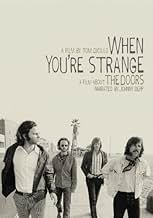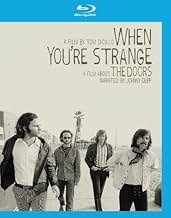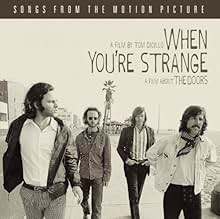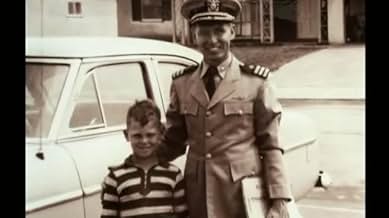A look at the late '60s and early '70s rock band The Doors, including rare exclusive footage.A look at the late '60s and early '70s rock band The Doors, including rare exclusive footage.A look at the late '60s and early '70s rock band The Doors, including rare exclusive footage.
- Awards
- 2 wins & 1 nomination total
Johnny Depp
- Narrator
- (voice)
John Densmore
- Self
- (archive footage)
Robby Krieger
- Self
- (archive footage)
Ray Manzarek
- Self
- (archive footage)
Jim Morrison
- Self
- (archive footage)
Pamela Courson
- Self
- (archive footage)
- (as Pam Courson)
The Doors
- Themselves
- (archive footage)
Murray Goodman
- Self - Judge
- (archive footage)
Jimi Hendrix
- Self
- (archive footage)
Lyndon B. Johnson
- Self
- (archive footage)
- (as Lyndon Johnson)
George S. Morrison
- Self - Jim's Father
- (as Admiral George S. Morrison)
Paul A. Rothchild
- Self
- (archive footage)
Adolf Hitler
- Self
- (archive footage)
- (uncredited)
Janis Joplin
- Self
- (archive footage)
- (uncredited)
John F. Kennedy
- Self
- (archive footage)
- (uncredited)
Robert F. Kennedy
- Self
- (archive footage)
- (uncredited)
- Director
- Writer
- All cast & crew
- Production, box office & more at IMDbPro
Featured reviews
10rtcblc
I was able to see this at Sundance this morning. What an outstanding film!! By weaving original footage from many sources including takes from a movie Jim Morrison made himself Mr. DiCillo presents an intimate view of all the DOORS in the context of the 60's and early 70's. An intimate look at the complex relationships between Morrison and the other members and hugely entertaining. DiCillo spoke at the end of the movie and during the Q&A's he mentioned one critic accused him of "recreating" footage in the film. The supposed recreated footage was actually Morrisons own film starring himself. This rumor is extremely frustrating to DiCillo as it is spreading via the internet. See for yourself, this is a excellent movie. I asked DiCillo if he had cooperation from Morrison's family. He said he had a lot of help from Morrisons family especially on the relationship between Jim and his father. I hope someone picks it up for distribution. I'd go again.
I'm a big fan of The Doors and pretty much knew the story before watching this film. And yet I found Johnny Depp to be a very convincing narrator (usually I find narrators to be quite annoying in documentaries!), and the film was quite fluid and easy to watch. Some really cool footage as well! For anyone who's interested, Oliver Stone's 1992 film The Doors is a good and fairly accurate non-documentary worth watching, if you haven't seen it already.
Having been a fan for over 20 years, I'm fairly jaded when it comes to bios on the Doors. The new footage and DiCillo's narrative structure offer a truly fresh look at the subject matter, since it's the first time I've really felt I've had an insider's view on the band. Morrison is treated like a real human being, stripped of all the legend and bombast. Instead of the pretentious rock star, you get to see Jim the person evolving over time, with all the joy and suffering that he experienced. There's a shot of him exiting the courtroom in Miami with a look of vulnerability that I found shocking, as it's at odds with image of the cool, cocky singer. The history of the band is subtly told though a wash of images and sparse narration which touch all the milestones without feeling like another retread. It definitely deserves another viewing, consider me a confirmed buyer of the DVD.
I attended a special screening of the music documentary "When You're Strange: A Film about The Doors" at the 2009 Los Angeles Film Festival. This was my 18th screening here and the first to be completely sold out.
Writer/director Tom DiCillo was able to gain access to original footage shot from 1966-71 by Paul Ferrara, a UCLA Film School buddy of flamboyant lead singer Jim Morrison. Those old, grainy films are all that were needed to make this stunning documentary -- no modern-day or additional footage was shot.
The dramatic voice-over was provided by Johnny Depp who, in a statement from DiCillo read prior to the screening, was the one person the filmmakers felt qualified to narrate the movie. It had to be someone with a passion for the music of The Doors, and Depp fit the bill.
With the assistance of the remaining living members, particularly band co-founder and keyboardist Ray Manzarek (who sat in front of me), the film is destined to be the definitive chronicle of the band's history. We finally discover the shocking truth behind the curious myths -- did Morrison really expose his genitals at that infamous Florida concert? Did he fake his own death? "When You're Strange" separates fact from fiction and puts to rest the many rumors surrounding the manic life and untimely death of Jim Morrison. The heretofore secret details behind the making of each amazing album (one took 11 months, another took less than a week) are mind-boggling. Naturally, there's plenty of music. Tons of it.
Like all music docs, the degree to which one connects with the film is directly proportional to one's familiarity with the music and/or artists featured in the production. This certainly applies here. Like some of the thrilling music documentaries I've seen at festivals in the past couple of years ("The U.S. vs. John Lennon," "Dixie Chicks: Shut Up and Sing," "The Wrecking Crew," "Kurt Cobain About a Son"), I put "When You're Strange" right at the top of my list. I was blown away. However, while I walked away feeling that this was an absolutely brilliant film, I have to give it a qualified thumbs up if only because there is no doubt many simply won't have the emotional response that I did. But, for fans of this music, "When You're Strange" is absolutely a must-see.
Writer/director Tom DiCillo was able to gain access to original footage shot from 1966-71 by Paul Ferrara, a UCLA Film School buddy of flamboyant lead singer Jim Morrison. Those old, grainy films are all that were needed to make this stunning documentary -- no modern-day or additional footage was shot.
The dramatic voice-over was provided by Johnny Depp who, in a statement from DiCillo read prior to the screening, was the one person the filmmakers felt qualified to narrate the movie. It had to be someone with a passion for the music of The Doors, and Depp fit the bill.
With the assistance of the remaining living members, particularly band co-founder and keyboardist Ray Manzarek (who sat in front of me), the film is destined to be the definitive chronicle of the band's history. We finally discover the shocking truth behind the curious myths -- did Morrison really expose his genitals at that infamous Florida concert? Did he fake his own death? "When You're Strange" separates fact from fiction and puts to rest the many rumors surrounding the manic life and untimely death of Jim Morrison. The heretofore secret details behind the making of each amazing album (one took 11 months, another took less than a week) are mind-boggling. Naturally, there's plenty of music. Tons of it.
Like all music docs, the degree to which one connects with the film is directly proportional to one's familiarity with the music and/or artists featured in the production. This certainly applies here. Like some of the thrilling music documentaries I've seen at festivals in the past couple of years ("The U.S. vs. John Lennon," "Dixie Chicks: Shut Up and Sing," "The Wrecking Crew," "Kurt Cobain About a Son"), I put "When You're Strange" right at the top of my list. I was blown away. However, while I walked away feeling that this was an absolutely brilliant film, I have to give it a qualified thumbs up if only because there is no doubt many simply won't have the emotional response that I did. But, for fans of this music, "When You're Strange" is absolutely a must-see.
"When You're Strange" recounts quite well the history of the 1960s rock band "The Doors" and its famous, charismatic vocalist Jim Morrison. Using archival and backstage footage, some early home pictures of Morrison, and integrating a history of the band's roots and rocky ride with then-current social upheavals, the film conveys all the chaos, change, and creativity that marked that turbulent era.
Some of the narrative retells information that the band's devotees have known for decades, like the origin of the name "The Doors", a reference to Aldous Huxley's 1954 book "The Doors Of Perception". And the very first song Robby Krieger wrote was "Light My Fire". But old details can be informative to new fans.
The film's choppy structure probably had some symbolic significance. But the first five minutes seemed unnecessary. And I could have done without the scenes of Morrison driving a car through the desert, which seemed irrelevant and out of context.
As someone who has been mesmerized by The Doors for a long time, I don't think I learned anything new. Yet, the never-before-seen visuals, Morrison's on-stage performances and backstage personality, combined with all that strange music, at times carnivalesque and at other times bluesy, were enormously interesting. About midway through, Morrison comes across best, as he sings "Touch Me", accompanied by an orchestra.
What's disconcerting is the change in Morrison. He starts out innocent and shy, then quickly morphs into an outrageous showman. His indulgence in drugs and hard drinking did him no favors. However, that over-the-edge artistic style was common in the 1960s. And death arrived at the early age of 27 not only for Morrison, but also for Janis Joplin, Brian Jones, Jimi Hendrix, and Morrison's girlfriend, Pamela Courson.
Forty years after his death, Jim Morrison still fascinates people. Part of that derives from his untimely death. But I think he and The Doors resonate today because they were musical poets, social revolutionaries who saw the inhumanity and evil in the world, and tried to change it, through music. With maybe a couple of exceptions, we do not now have comparably influential poets. Jim Morrison and The Doors call to us from the past.
Some of the narrative retells information that the band's devotees have known for decades, like the origin of the name "The Doors", a reference to Aldous Huxley's 1954 book "The Doors Of Perception". And the very first song Robby Krieger wrote was "Light My Fire". But old details can be informative to new fans.
The film's choppy structure probably had some symbolic significance. But the first five minutes seemed unnecessary. And I could have done without the scenes of Morrison driving a car through the desert, which seemed irrelevant and out of context.
As someone who has been mesmerized by The Doors for a long time, I don't think I learned anything new. Yet, the never-before-seen visuals, Morrison's on-stage performances and backstage personality, combined with all that strange music, at times carnivalesque and at other times bluesy, were enormously interesting. About midway through, Morrison comes across best, as he sings "Touch Me", accompanied by an orchestra.
What's disconcerting is the change in Morrison. He starts out innocent and shy, then quickly morphs into an outrageous showman. His indulgence in drugs and hard drinking did him no favors. However, that over-the-edge artistic style was common in the 1960s. And death arrived at the early age of 27 not only for Morrison, but also for Janis Joplin, Brian Jones, Jimi Hendrix, and Morrison's girlfriend, Pamela Courson.
Forty years after his death, Jim Morrison still fascinates people. Part of that derives from his untimely death. But I think he and The Doors resonate today because they were musical poets, social revolutionaries who saw the inhumanity and evil in the world, and tried to change it, through music. With maybe a couple of exceptions, we do not now have comparably influential poets. Jim Morrison and The Doors call to us from the past.
Did you know
- TriviaFor the first time in the band's history unprecedented access was granted, regarding the previously unseen footage of Jim Morrison.
- GoofsA mock newspaper clipping announces both that Sharon Tate and her friends have been found murdered and that Charles Manson and his "Family" are suspected. Manson and the "Family" were not identified as the Tate killers until December 1969, more than four months after the murders happened.
- Quotes
Jim Morrison: The music can't help but reflecting things that are happening around you
- ConnectionsEdited from Feast of Friends (1969)
- How long is When You're Strange?Powered by Alexa
Details
- Release date
- Country of origin
- Official site
- Language
- Also known as
- The Doors. When you're strange
- See more company credits at IMDbPro
Box office
- Gross US & Canada
- $246,078
- Opening weekend US & Canada
- $66,833
- Apr 11, 2010
- Gross worldwide
- $1,194,182
- Runtime
- 1h 26m(86 min)
- Color
- Sound mix
- Aspect ratio
- 1.85 : 1
Contribute to this page
Suggest an edit or add missing content




































